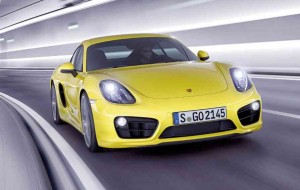Sneak peek: Porsche Cayman
When the Boxster was first launched in 2005, Porsche purists were snobbish about the new model. Their view was that there was only one “proper” layout for a Porsche. Now that the family includes former heresies such as the Cayenne and Panamera, the Boxster and its hardtop counterpart, the Cayman, have found a solid niche within the brand.
What is it: the third generation of Porsche’s mid-engined hardtop sports car. The new Cayman is lower, longer, lighter and of course faster than its predecessor.
Design: The Cayman features an extended wheelbase with shorter overhangs, a styling cue that is a visible improvement particularly over the first generation. Eighteen- and 19-inch wheels fill out the wheel wells and complement what Porsche calls “precise lines and razor-sharp sculpted edges.” The windshield has been shifted forward and the roofline raked backward to give an impression of dynamic power. The doors incorporate prominent recesses that scoop air into the mid-mounted engine, a clear visual cue of the car’s layout. A rear spoiler pops out from the rear deck at speed.
Engine and transmission: There’s a choice between two engines. The Cayman has a 2.7-liter flat-six with a decent 275 horsepower. This is good for 0-100 kilometers per hour in 5.4 seconds, on to a top speed of 266 kph. The Cayman S has a larger 3.4-liter unit good for 325 HP. Acceleration to 100 kph drops to 4.7 seconds, and top speed goes up to 283 kph. Standard transmission is a six-speed manual, with a twin-clutch transmission available as an option. The PDK enables the car to accelerate even faster and achieve better fuel economy.
Suspension: Cayman uses McPherson struts front and rear, with additional longitudinal and transverse control arms at the rear. Brakes are massive 315-millimeter discs up front and 299mm at the rear, both with four-piston aluminum monobloc calipers. Its Adaptive Cruise Control can help monitor and maintain distance to the car ahead while in traffic.
Built at: the former Karmann plant in Germany. Which is all the better, for us to appreciate the heritage and history of Porsche and VW.

